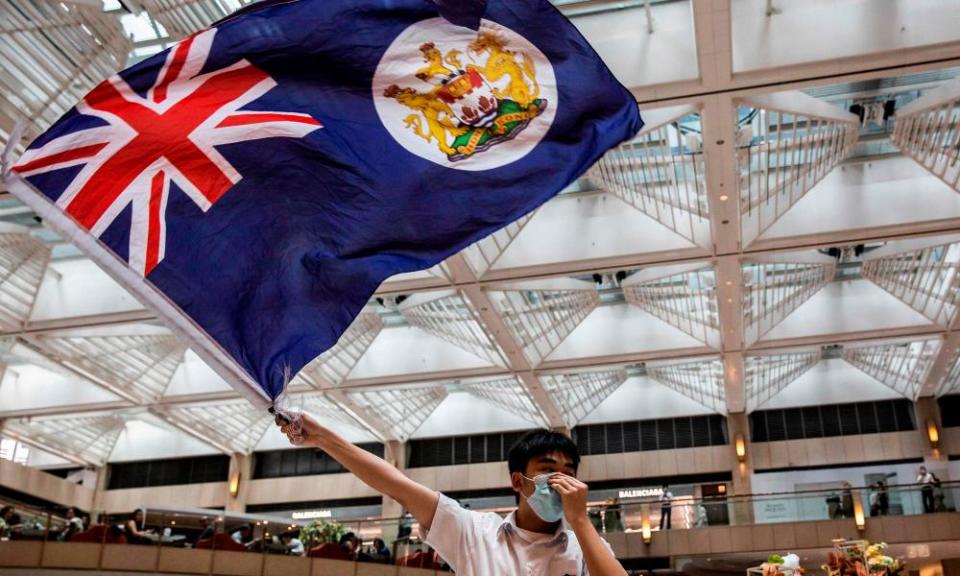Beijing’s lessons and laws: why Hong Kong families are looking to Britain

Arthur fears that as the Chinese Communist party tightens its grip on Hong Kong, his kids’ education will be undermined. Gloria Siu is worried that the sweeping new security law imposed by Beijing could mean she faces retribution for pro-democracy posts on social media.
Both say they plan to take up Boris Johnson’s unexpected offer of a path to British citizenship for the city’s residents – if China doesn’t back down on its harsh legislation – not because they want to leave their home, but because they fear what the future holds there.
The law, a response to a year of anti-government protests, allows Chinese security forces to operate in Hong Kong and targets “secession, subversion and terrorism”. These charges are often used to suppress dissidents and critics on the mainland, leading to fears they will be deployed for the same purpose in the city.
Over the past week there has been a huge surge of interest in British National Overseas passports, hybrid documents issued by British colonial authorities that allow their holders to travel under British consular protection, but until now have not conferred the right to settle in the UK.
Arthur runs an online chamber of commerce focused on BNO holders – although it is officially called the “Blue Navy Organisation Chamber of Commerce”, to avoid problems registering the business with pro-Beijing authorities.

It has 5,000 members on a Facebook page that mixes tips about life in the UK with ads for events like a “Brighton Beach craft market” scheduled for later this month.
Arthur and his business partner Ericsson, who preferred not to give their surnames, say they have been deluged with queries about how to renew BNO passports and prepare for life in Britain, even as they step up their own plans to move.
“My concern is when the security law comes to Hong Kong, the education will be more communist,” said Arthur, who is in his 30s with two young children. “If you don’t want this kind of education, you have to pay a huge amount of money to study at a private school, but most of us normal people can’t afford that.”
He loves the UK, and had hoped to spend time in Manchester when he retires, in perhaps 30 years, watching his beloved Manchester United play live. Now that time frame has suddenly shrunk. “For my children I have to move up my planning.”
Johnson has not spelt out the details of the “path to citizenship”, and has said it is contingent on China going ahead with the security law. But that law has already been passed by the rubber-stamp parliament in Beijing, bypassing Hong Kong’s own legislature, and signalling an effective end to Hong Kong’s autonomy.
Johnson’s announcement makes moving easier and helped me to make up my mind
Liz Ng
The turmoil of the last year’s pro-democracy protests through its streets, and China’s heavy-handed response, has accelerated many plans.
“My husband and I have been discussing leaving for some time. We made an investment in the UK already, we bought a property to let,” said Siu, a corporate communications professional in her 30s. She expects the move to mean a career change, one reason she was reluctant to pursue life abroad.
But their horizons for life in Hong Kong have slowly receded. “Last year we thought we’d leave in three or four years’ time. Now this has happened [the national security law] we need to look again into how soon we should go.”
“I’ve been doing a lot of sending and sharing [pro-democracy messages] on Twitter, Facebook, this is nothing very special but [under the new laws] you might get arrested for unknown reasons,” Siu said. “Johnson’s announcement makes moving easier and helped me to make up my mind.”
Liz Ng, a marketing executive, spent three years at school in the UK, but had never thought of leaving her home city until the new security law was announced.
“Now we understand the CCP [Chinese Communist party] can apply any laws to Hong Kong,” she said. “Johnson’s offer is the main reason I’m thinking of the UK.”
Fear about Britain’s economy and jobs market is shared by many of those preparing the move, or just considering it. A legal assistant in her 40s, who has attended many protests and asked to go by the name Maria for fear of retaliation under the new law, said concern about employment was one thing holding her back.
“Most HK people are always considering moving abroad, but they will still stay here because they need to earn money, and only if the worst comes to the worst will they go to other countries,” she said. For her, that moment will come when her daughter wants to leave.
Because the 22-year-old student was born after the 1997 handover, she is not eligible for a BNO passport in her own right, and the status cannot be passed to descendants.
“It all depends on her, we have been discussing this – and she is not that ready to go, she wants to stay until the last moment to fight against the CCP. Even if we cannot win,” Maria said.
This effective age limit is one of the big concerns about the UK’s offer. It excludes the city’s youngest pro-democracy protesters. “I know BNO is not exactly a foreign passport, but I would feel more secure if I had one,” her student daughter said. “It’s like a lifeboat. It would be good if my mother could pass it on.”

 Yahoo News
Yahoo News 
